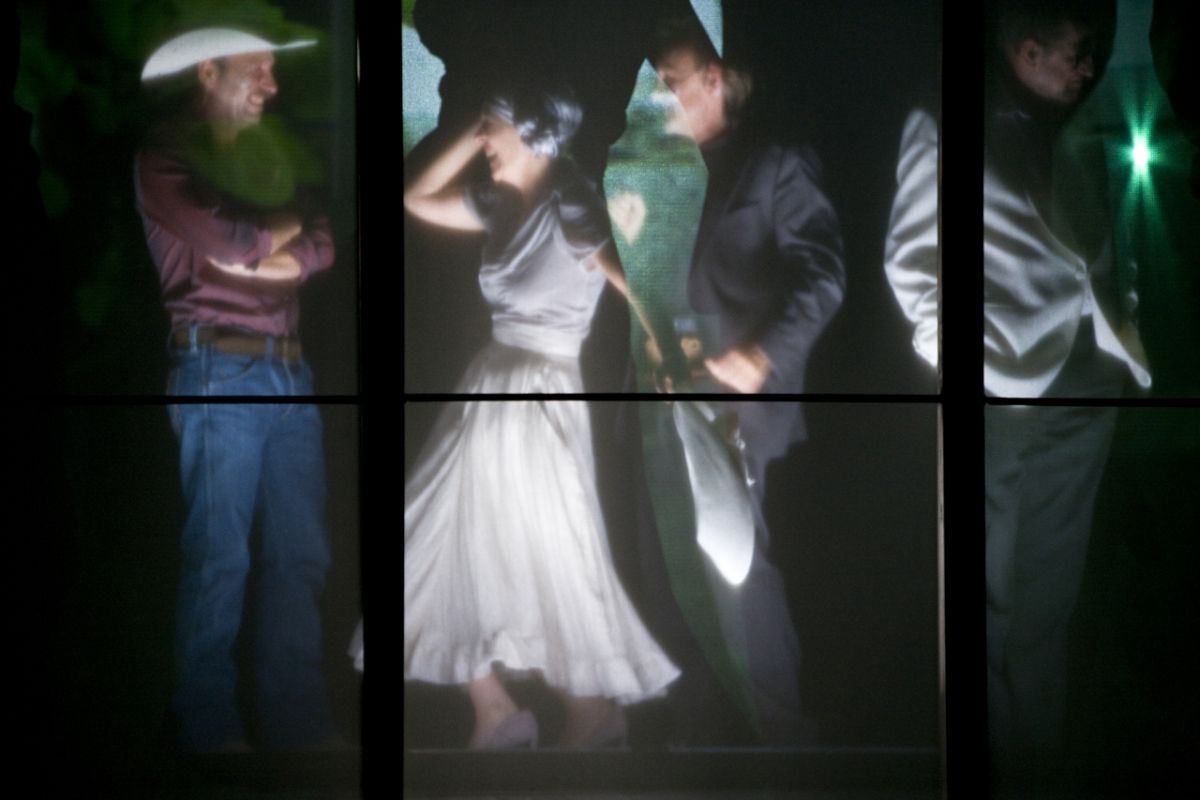
In the integration of video and live theatre Guy Cassiers and his team at Antwerp's Toneelhuis have reached a level of perfection that is hard to beat. In one scene in Onder de vulkaan, an adaptation of Malcolm Lowry's Under the Volcano, a sky projected on a backdrop blends with an actor's face, thoughts become words become clouds. The layered video fragments of streets, plants, and interiors, shot on location in Mexico, become an extension of Firmin's psychological landscape. The stage lights that shine through the backdrop become sparkles of light in his gradual decline. At times the video is almost visceral such as when a razor blade scraping across a man's chin is filmed from up close and blown up to fill the entire backdrop.
So much for the good.
Under the Volcano is yet another stage adaptation of a novel as has become popular in Dutch and German theatre since the mid 90s or so. When novels are adapted for theatre they are reduced to the dialogues, as if this were the novel's essence. Sometimes a narrator is introduced to provide the audience with the novel's setting. In case of Under the Volcano this is straightforward, because in the first chapter we are introduced to Jacques Laruelle who, on the Day of the Dead, 1 November 1939, sits down with Dr. Arturo Vigil for a drink at the Hotel Casino de la Selva near Quauhnahuac, Mexico and recalls the events of that same day, one year earlier, when Geoffrey Firmin died. The theatrical adaptation more or less faithfully reproduces this scene by having Jacques Laruelle sit on a chair and recount his memories. The scene ends when he gets up, grabs his chair and leaves the stage. In the next scene Firmin enters and we're back in 1938. Laruelle returns in his role as narrator in the final scene, this time out of a dramaturgic necessity so as to recount what is happening in the novel's final chapter. It brings out what I find problematic about bringing novels to the stage.
A novel narrates, it tells a story and creates its own universe. Theatre does not narrate, it enacts, it portrays the tension between characters. A novel can do without characters, theatre can't. Of course novels incorporate dialogue, and an actor on stage can tell a story by delivering a monologue. But a story creates a distance between the person telling the story and the story being told. Theatre puts the event right in front of you. When Firmin asks for another drink on stage it has dramatic tension. When a narrator says: "Firmin asked for another drink" it hasn't, it is just a piece of information. Whereas the novel comes to a dramatic conclusion with both Yvonne's and Firmin's death, the stage adaptation just fades out.
There is a lot that is lost in the theatrical adaptation, or maybe I missed it, such as the novel's circularity. The first chapter ends with the lines "Suddenly from outside a bell spoke out, then ceased abruptly: dolente ... dolore! Over the town, in the dark tempestuous night, backwards revolved the luminous wheel." In the final chapter, right after the consul has been shot we read: "A bell spoke out: Dolente ... dolore!"
What is also completely lost in the theatrical adaptation is the rhythmic quality of Lowry's writing, which makes Under the Volcano such a brilliant novel. This is only partly made up for by the poetic images projected onto the backdrop.
A theatrical adaptation of a novel can result in a great work of art. Unfortunately, often it just becomes a visual illustration of the novel's dialogues. What I loved about Gatz by Elevator Repair Service was how the novel and its reenactment became part of the drama. I also liked Guy Cassier's adaptation of Proust's In search of lost time. It succeeded, because it was primarily visual-textual theatre without dramatic action. It was mostly inner voices come to life.
The acting in Onder de Vulkaan exemplifies what I dislike about theatre, people pretending to be drunk and pretending to be angry and so we get all the familiar caricatures. Art to me is about finding new forms of expression. In this respect the production fails where it succeeds in its integration of theatre and video. There Cassiers does find a new form to express Firmin's inner turmoil.
Guy Cassiers next project will be an adaptation in three parts of Robert Musil's Man without Qualities.